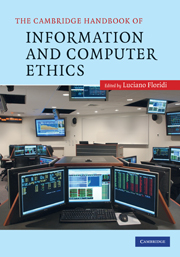Book contents
- Frontmatter
- Contents
- List of contributors
- Preface
- Acknowledgements
- Part I Introduction and background
- 1 Ethics after the Information Revolution
- 2 The historical roots of information and computer ethics
- Part II Ethical approaches
- Part III Ethical issues in the information society
- Part IV Ethical issues in artificial contexts
- Part V Metaethics
- Epilogue: The ethics of the information society in a globalized world
- References
- Index
2 - The historical roots of information and computer ethics
Published online by Cambridge University Press: 05 June 2012
- Frontmatter
- Contents
- List of contributors
- Preface
- Acknowledgements
- Part I Introduction and background
- 1 Ethics after the Information Revolution
- 2 The historical roots of information and computer ethics
- Part II Ethical approaches
- Part III Ethical issues in the information society
- Part IV Ethical issues in artificial contexts
- Part V Metaethics
- Epilogue: The ethics of the information society in a globalized world
- References
- Index
Summary
Introduction
During the Copernican Revolution in the sixteenth and early seventeenth centuries, major changes in science and philosophy led human beings to see themselves, and indeed the entire Universe, in a radically different perspective. Traditional assumptions about human nature and the role of humans in the Universe were in question, and significant changes occurred in our understanding of society and religion. Centuries later, first Darwinian biology and then Freudian psychology altered – yet again – some fundamental assumptions about human nature (Floridi 2008a), though they did not significantly change our view of the Universe as a whole. Today, the information revolution, including its associated scientific and philosophical developments, has begun to yield a radically different view of human nature and the world. In physics, for example, recent discoveries indicate that the Universe is made of information, and human beings are exquisitely complex ‘informational objects’ (Wheeler 1990, Lloyd 2006). In philosophy – in particular, in the ‘philosophy of information’ of Luciano Floridi (e.g., Floridi 2008a, Floridi 2008e) – human beings are viewed as sophisticated informational beings, similar in many ways to the vast array of ICT-artefacts emerging in our ‘information society’. At a certain ‘level of abstraction’, humans and their ICT-artefacts can be seen as companions – fellow travellers on a mutual journey of existence in an informational universe (Floridi 2008a). This new way of understanding human nature and the place of humans in the world raises a number of new ethical questions (Floridi 2008d).
Keywords
Information
- Type
- Chapter
- Information
- Publisher: Cambridge University PressPrint publication year: 2010
Accessibility standard: Unknown
Why this information is here
This section outlines the accessibility features of this content - including support for screen readers, full keyboard navigation and high-contrast display options. This may not be relevant for you.Accessibility Information
- 17
- Cited by
